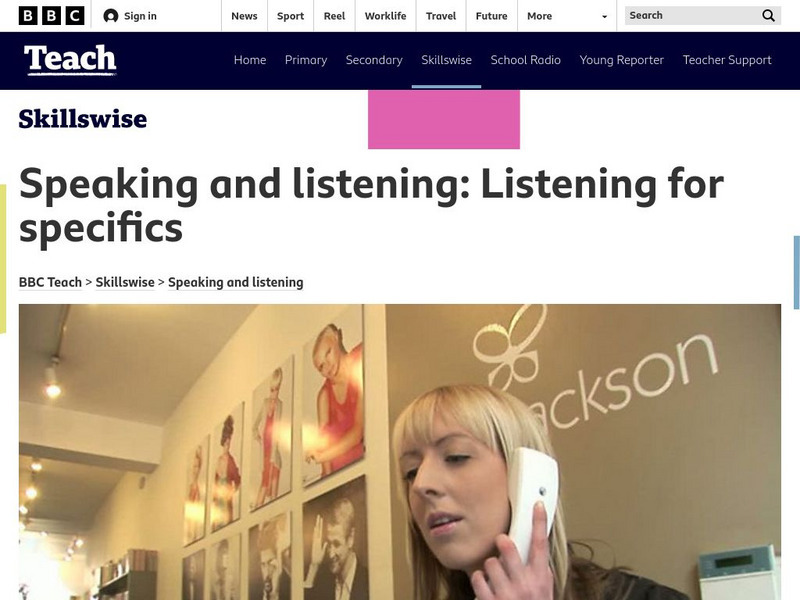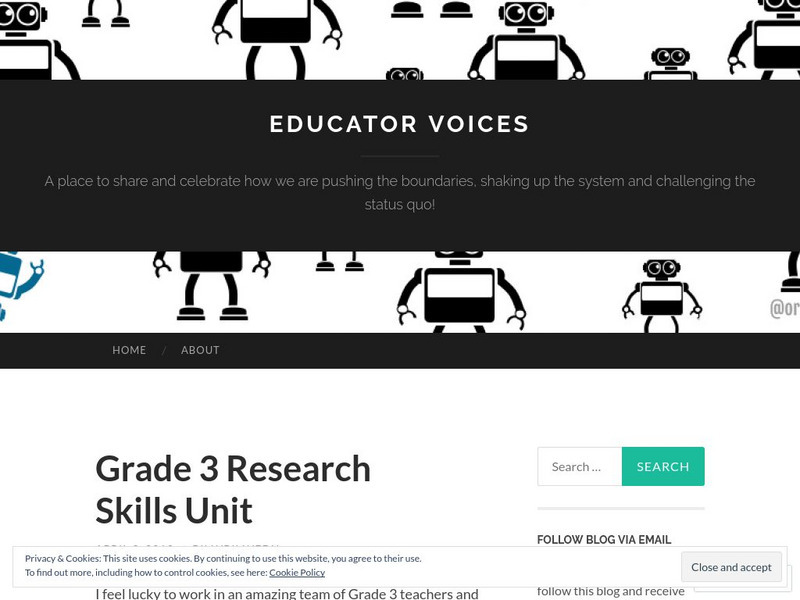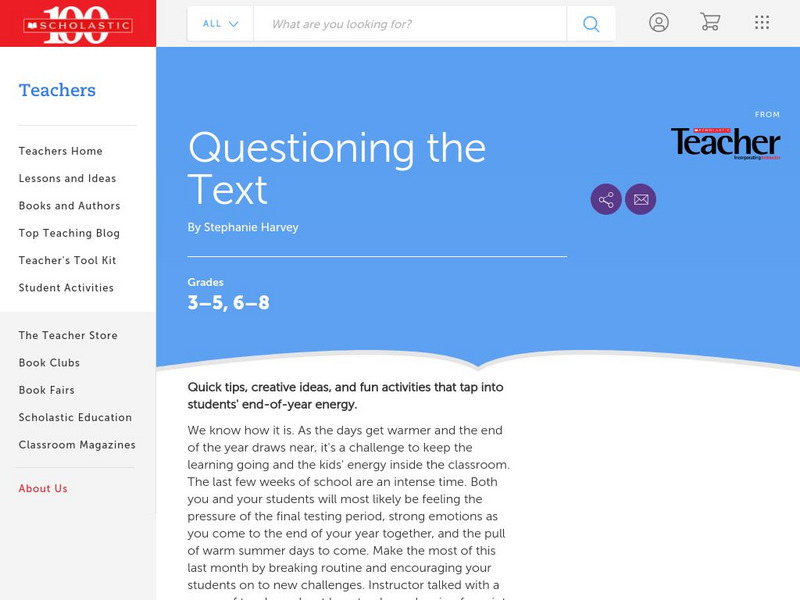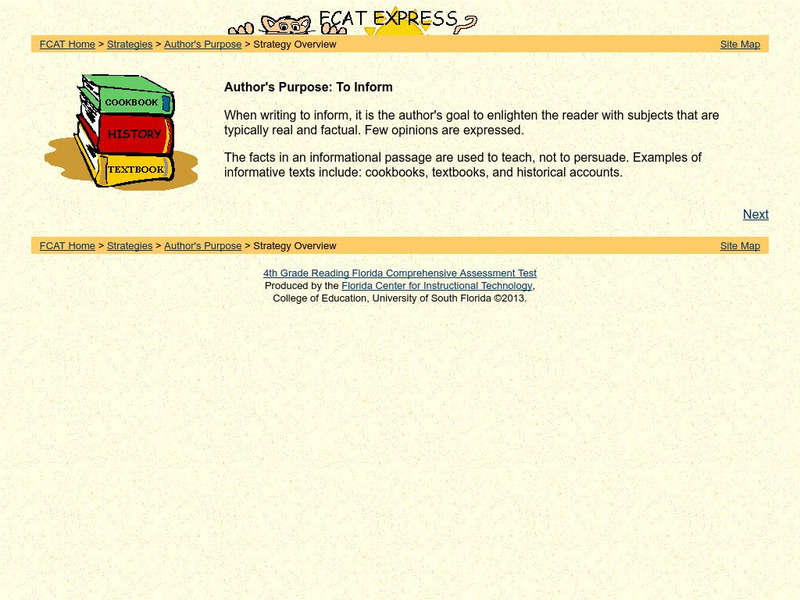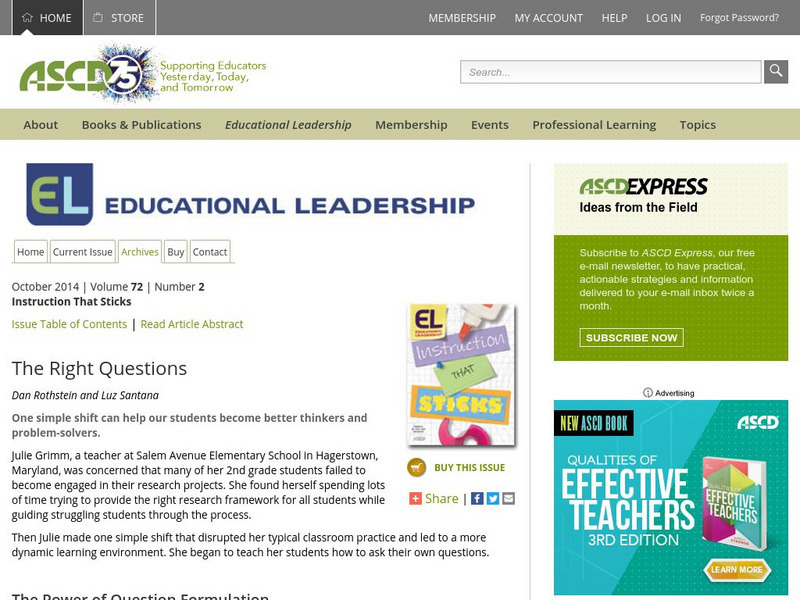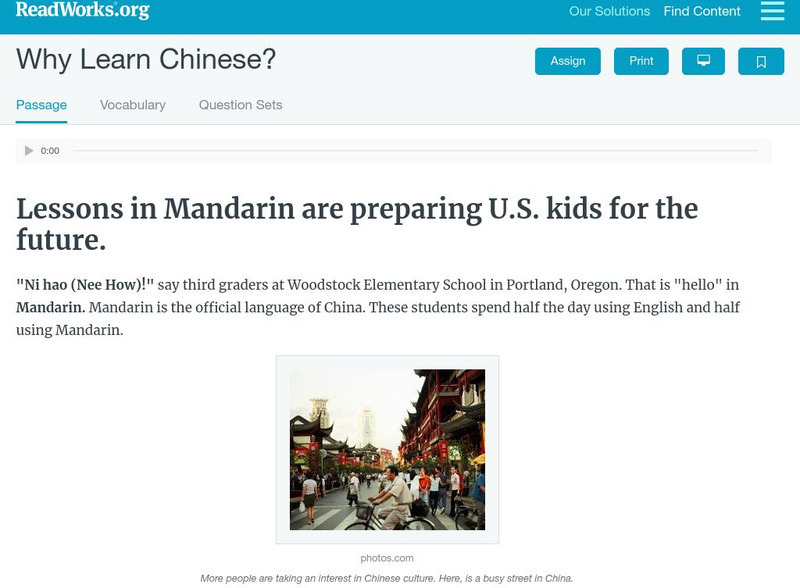BBC
Bbc Skillswise: Listening for Specific Information
This tutorial presents a video, factsheets, and worksheets for learning how to listen for and understand information. It looks at how to handle different situations, e.g., arranging a delivery, asking questions about a product before...
Better Lesson
Better Lesson: Researching a Topic: Teaching Students to Research Information
Students will conduct a short research project about a topic. This lesson focuses on how to find the information needed on their chosen topic.
Other
Educator Voices: Grade 3 Research Skills Unit
Describes the process teachers went through to create a lesson unit where students first brainstormed what it means to do research, then were tasked with choosing a topic, researching it, and presenting on it several days later. The...
Quia
Quia: Reading Comprehension (Reading for Facts)
There are 30 questions in this activity. Practice your reading skills with one or two short stories at a time. Read the story, then choose the answer that best answers the question.
FNO Press
Fno.org: Inspired Investigations
An article at From Now On about how to help students do better research by changing the focus of research assignments and teaching students to ask essential questions. Some suggestions include using mind mapping, and using Inspiration to...
Michigan State University
Michigan State University: Interventions for Reading Strategies: Qar Strategy
This Michigan State University site suggests three question-answer relationships strategies, rather than four, leaving out "author and you." Includes examples of each relationship, steps for teaching, and assessment.
Scholastic
Scholastic: Questioning the Text
In this magazine article originally featured in Instructor, the reading strategy called "questioning the text" is explained by the renowned literacy consultant and staff developer, Stephanie Harvey. The steps included for questioning the...
Other
Reading Educator: Question Answer Relationships
Based on the presumption that every teacher shares responsibility for teaching reading, this page offers a brief look at question-answer relationships, as well as suggestions for putting the strategy to use in the classroom.
Other
Questioning.org: The Question Mark
Jamie McKenzie's book, Beyond Technology: Questioning, Research and the Information Literate School, emphasizes the need to teach children to ask important questions, then research the answers, instead of just learning information...
Other
Cable News Network, Inc.: Learning Resources: Story Archives
Links to various new stories sorted alphabetically by title and by category. Each story is available in full story, abridged story, or story outline format.
University of South Florida
Fcat Express: Author's Purpose
Learn about author's purpose and then answer some self-assessment questions after the lesson. Continue clicking the next button to get to more information.
Other
Harvard College: Teaching Students to Ask Their Own Questions
An article, written by two Harvard scholars, provides six steps to help students formulate questions.
ReadWriteThink
Read Write Think: Applying Question?answer Relationships to Pictures
Contains plans for two lessons that develop students' ability to ask questions about the pictures in a text. In addition to objectives and standards, this instructional plan contains links to sites used in the lessons as well as...
Other
Live Worksheets: Question Words
This interactive worksheet features interrogative sentences with missing question words. Students will type in one of following words or phrases into each sentence: who, what, where, why, when, how, and more. Students will then submit...
ReadWriteThink
Read Write Think: Guided Comprehension: Self Questioning
Online lesson introduces students to the concept of self-questioning, assisting them in an understanding of question-answer relationships that should improve their reading comprehension skills. In-depth study will lead to improved...
Michigan State University
Michigan State University: Intervention for Reading: Paraphrasing
Improve understanding of expository materials by getting the main ideas through paraphrasing. The paraphrasing strategy helps students recall the main ideas and specific facts of materials they read. There are three steps for teaching...
ReadWriteThink
Read Write Think: Talking About Books to Improve Comprehension
This lesson is a conversation-starter! In this lesson, students learn about striking up deep-thought conversations and staying on topic in the form of a book talk.
Other
Thoughtful Learning: Minilesson: Asking and Answering the 5 W's and H Questions
Students will learn the "5 W's and H questions" needed to comprehend a news story. Then students will apply these question words [who, what, where, why, when, and how] to real news stories and to events in their own lives.
Association for Supervision and Curriculum Development (ASCD)
Ascd: The Right Questions
Learn the Question Formulation Technique to help students express their thinking without having to depend on teacher questioning to peak their curiosity. There are 6 steps and examples of use in the classroom.
Read Works
Read Works: Why Learn Chinese
[Free Registration/Login Required] Students read about why some third-graders are learning to speak Mandarin. A question sheet is available to help students build skills in drawing conclusions.
Read Works
Read Works: It's All in the Mind
[Free Registration/Login Required] An informational text debating whether or not psychics are real. A question sheet is available to help students build skills in reading comprehension.
Read Works
Read Works: Oral Histories
[Free Registration/Login Required] An informational text about the importance of listening to and writing about people's life stories. A question sheet is available to help students build skills in reading comprehension.
Read Works
Read Works: Oral Histories
[Free Registration/Login Required] Intended to support elementary students' reading comprehension, students will learn about jobs that require them to conduct interviews to collect oral histories. Questions that assess multiple reading...
Education Development Center
Education Development Center: Tv411: Parts of a Newspaper
Students click through a lesson about the parts of a newspaper and answer questions about the types of articles found in each section, headlines, and captions that would go with photographs. Links to related videos are also provided.


